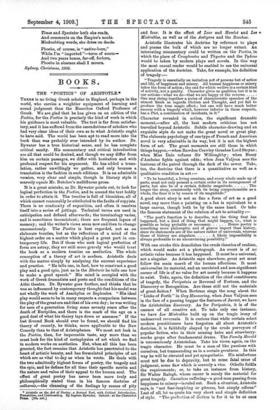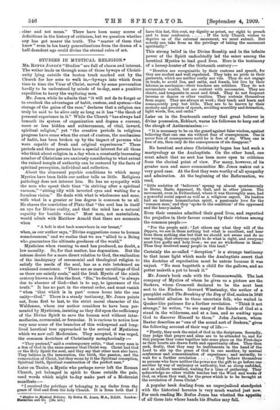BOOKS.
THE "POETICS" OF ARISTOTLE.*
THERE is no living Greek scholar in England, perhaps in the world, who carries a weightier equipment of learning and sound judgment than the Emeritus Oxford Professor of Greek. We are glad that he has given us an edition of the Poetics, for the Poetics is precisely the kind of work in which his guidance is most valuable. The text is far from satisfac- tory, and it has suffered from the emendations of scholars who had very clear ideas of their own as to what Aristotle ought to have said. The world has been apt to read more into the book than was probably ever intended by its author. Dr. Bywater has a true historical sense, and he has complete critical sanity. His commentary and critical introduction are all that could be desired, and though we may differ from him on certain passages, we differ with hesitation and with profound respect for his argument. He has added a trans- lation, rather unwillingly we gather, and only because a translation is the fashion in such editions. It is an admirable version, very clear and simple, though in literary style it scarcely equals Mr. Butcher's mellifluous prose.
It is a great mistake, as Dr. Bywater points out, to look for logical perfection in the Poetics, and to amend the text boldly in order to attain it. The treatise is full of blemishes, all of which cannot reasonably be attributed to the faults of copyists. There is no continuity of exposition, and often it resolves itself into a series of jottings. Technical terms are used in anticipation and defined afterwards ; the terminology varies, and is sometimes inconsistent ; there are frequent lapses of memory ; and the writer's views seem now and then to change unconsciously. The Poetics is best regarded, not as an elaborate treatise, but as the reflections of a mind of the highest order on a matter which played a great part in con- temporary life. But if those who seek logical perfection of form are astray, they err still more gravely who would treat the book as a modern treatise on aesthetics. The whole conception of a theory of art is modern. Aristotle deals with the matter simply by analysing the cuiTent experience and practice. "He tells one, in fact, how to construct a good play and a good epic, just as in the Rhetoric he tells one how to make a good speech." His mind is occupied with the work of Greek dramatists and poets and the conditions of the Attic theatre. Dr. Bywater goes further, and thinks that he was so influenced by contemporary thought that his model was not wholly the work of Aeschylus or Sophocles. "His ideal play would seem to be in many respects a comparison between the play of the great era and that of his own day ; be was writing for men of a generation living some seventy years after the death of Euripides, and there is the mark of the age on a good deal of what his theory lays down or assumes." If the lost Second Book should ever he found, we should find his theory of comedy, he thinks, more applicable to the New Comedy than to that of Aristophanes. We must not look in the Poetics, then, for impeccable taste, any more than we must look for the kind of metaphysics of art which we find in modern works on aesthetics. But, when all this has been granted, the fact remains that Aristotle has penetrated to the heart of artistic beauty, and has formulated principles of art which are as vital to-day as when he wrote. He deals with the two admittedly highest forms of poetry, the tragedy and the epic, and he defines for all time their specific merits and the nature and value of their appeal to the human soul. The effect of great poetry has never been more truly and philosophically stated than in his famous doctrine of catharsis,—the cleansing of the feelings by means of pity • Aristotle on the Art of Poetry; a Revised Text, with Critical Introduction, Translation, and Commentary. By Ingrain Bywater. Oxford: at the Clarendon Press. Liss. net.] • and fear. It is the effect of Lear and Hamlet and Les Miarables, as well as of the Antigone and the Bacchae.
Aristotle illustrates his doctrine by reference to plays and poems the bulk of which are no longer extant. An
interesting commentary could be written on the Poetics, in which the place of Cresphontes and Thyestes and the Tydeus would be taken by modern plays and novels. In this way the most casual reader would be enabled to see the universal application of the doctrine. Take, for example, his definition of tragedy :—
" Tragedy is essentially an imitation not of persons but of action and life, of happiness and misery. All human happiness or misery takes the form of action; the end for which we live is a certain kind of activity, not a quality. Character gives us qualities, but it is in
our actions—what we do—that we are happy or the reverse One may string together a series of characteristic speeches of the utmost finish as regards Diction and Thought, and yet fail to produce the true magic effect ; but one will have much better success with a tragedy which, however inferior in those respects, has a Plot, a combination of incidents, in it."
Character revealed in action, the significant dramatic moment,—after all, the beat modern criticism has not travelled beyond Aristotle-. Subtle character-drawing and an
exquisite style do not make the great novel or great play. The elaborate psychology of one type of French and American novel is very admirable in its way, but it is not the highest form of art. The great moments are still those in which things happen,—when Rawdon Crawley thrashes Lord Steyne ; when Miss Dale refuses Sir Willoughby ; when Bussy d'Araboise fights against odds ; when Jean Valjean sees the lanterns of the patrol through the dark of the sewer. Take, too, the doctrine that there is a quantitative as well as a qualitative condition in art :—
" To be beautiful, a living creature, and every whole made up of parts, must not only present a certain order in its arrangement of
parts, but also be of a certain definite magnitude The longer the story, consistently with its being comprehensible as a whole, the finer it is by reason of its magnitude."
A good short story is not as fine a form of art as a good novel, any more than a painting on a fan is equivalent to a large canvas, though both be by the same hand. Or take the famous statement of the relation of art to actuality :—
"The poet's function is to describe, not the thing that has happened, but a kind of thing that might happen, i.e., what is possible as being probable or necessary Hence poetry is something more philosophic and of graver import than history, since its statements are of the nature rather of universals, whereas those of history are singulars A likely impossibility is always preferable to an unconvincing possibility."
With one stroke this demolishes the crude theories of realism, which would make art a photograph. An event is of n6 artistic value because it has happened. It must be a universal, not a singular. As Aristotle says elsewhere, great art must
follow the main march of the human affections. It must universalise its material, and an unrelated and non-significant
corner of life is of no value for art merely because it happens to exist. Take, again, the definition of the chief constituents of tragedy, the Peripateia or Reversal of Fortune, and the Discovery or Recognition. Are these still not the materials of great fiction ? When Bertram sings the song about the "Links of Forth" in Guy Mannering, when Jean Valjean sees in the face of a passing beggar the features of Javert, we have the Aristotelian discovery. As for Peripateia, it is of the essence of all creative art. To take only one instance, we have Les Miserables built up on the tragic irony of undeserved reversals. It is curious that while certain select modern practitioners have forgotten all about Aristotle's doctrine, it is faithfully obeyed by the crude purveyors of popular fiction, who in their missing heirs and strawberry- marks grope after fundamental drama. The Family Herald is unconsciously Aristotelian. Take his views, again, on the tragic character. He must be a man of like passions with ourselves, but transcending us in a certain greatness. In this way he will be elevated and yet sympathetic. His misfortune
must not be due to depravity, but to some fatal error of judgment, some flaw which is scarcely a vice. Othello fulfils
the requirements ; or, to take an instance from history, Sir Walter Ralegh, whose career is surely the material for great tragedy. Causeless suffering—a good man passing from happiness to misery—is ruled out. Such a situation, Aristotle says, is "not fear-inspiring or piteous, but simply odious." Last of all, let us quote his very short and simple definition of style. "The perfection of diction is for it to be at once clear and not mean." There have been many scores of definitions in the history of criticism, but we question whether any has got nearer the truth. The "master of them that know" even in his hasty generalisations from the drama of a half-decadent age could divine the eternal rules of art.







































 Previous page
Previous page